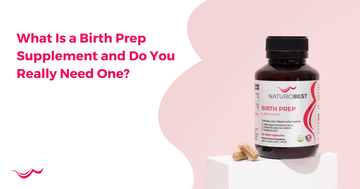What Do Pregnancy Vitamins Actually Do in the Second and Third Trimesters?
by NaturoBest Naturopath Team on Aug 26, 2025

Your baby's growth is accelerating—and so are your nutrient needs.
By the time you reach the second and third trimesters, everything feels more real. You may feel movement, see changes in your body, and start preparing in earnest for birth. But amid the excitement, fatigue, and backaches, there's something many women don’t realise: nutritional demands don’t stay static throughout pregnancy. They increase—dramatically.
If you’re still taking a general prenatal, or relying mostly on diet, it might not be enough to support your body or your baby’s rapidly evolving development.
The Truth About Mid-to-Late Pregnancy Nutrition
In the early weeks, prenatal nutrition is all about laying the foundation—supporting neural tube development, forming the placenta, and beginning organogenesis.
But once you move into the second trimester, the building phase shifts gears. Your baby’s skeleton is forming, their brain is growing rapidly, and you’re literally growing a new human at astonishing speed. This takes a lot of raw materials—especially nutrients like calcium, magnesium, iodine, and DHA (from diet).
In the third trimester, the demands continue to climb. Iron requirements surge to support your growing blood volume and prepare for blood loss at birth. Your baby’s organs—particularly the lungs and liver—are maturing. And you? You might be feeling more exhausted, having trouble sleeping, or experiencing restless legs and muscle cramps.
If any of this sounds familiar, it’s not just the toll of pregnancy—it could also be your body’s way of signalling that it needs more nutritional support.
Second Trimester: Building Bones, Brain & Strength
The second trimester is often considered the “honeymoon phase” of pregnancy. Energy lifts, morning sickness (hopefully) subsides, and you might start feeling those first fluttery kicks.
But behind the scenes, your baby is working overtime.
Key nutrient needs in the second trimester include:
-
Calcium & Magnesium – Vital for developing bones and teeth. Your baby will draw these minerals directly from you, which can leave you depleted if you’re not replenishing them.
-
Iodine – Supports your baby’s developing brain and thyroid gland.
-
Activated B vitamins – Support energy production and red blood cell formation as your blood volume increases.
-
Choline – Essential for cognitive development, choline contributes to healthy brain and spinal cord formation alongside folate.
Without targeted support, many women report muscle cramps, low energy, or even trouble concentrating—common signs that your body may be struggling to meet both you and your baby’s needs.
Third Trimester: Iron Demands, Energy Dips & Organ Maturation
The third trimester is when your baby starts putting on fat, practicing breathing, and gearing up for life outside the womb. Your body is simultaneously preparing for labour and postpartum recovery.
That means your nutrient needs change again.
Notable nutrient priorities in the third trimester include:
-
Iron (bioavailable) – Crucial to avoid deficiency as your blood volume increases and your baby stores iron for their first six months. Iron deficiency is one of the most common issues in late pregnancy, contributing to fatigue, poor concentration, and increased infection risk.
-
Iodine & Choline – Continue to support brain development and metabolic regulation.
-
Vitamin C – Supports iron absorption and contributes to healthy tissue repair and immune function.
-
Vitamin D - vitamin D status of the mum during later pregnancy affects the status of the newborn for the first few months of life.
-
Magnesium – May help reduce muscle cramps and promote restful sleep.
It’s also a time when emotional wellbeing can waver—many women feel anxious about labour, sleep-deprived, and overwhelmed. Targeted nutrition can’t solve everything, but it lays the foundation for greater resilience, energy, and strength when you need it most.
Why Bioavailability Matters (Now More Than Ever)
It’s not just what you take—it’s how well your body can absorb it.
Pregnancy changes how your digestive system functions, which can make it harder to absorb certain nutrients, especially if you’re experiencing reflux or constipation.
That’s why bioavailable vitamins and minerals—such as activated B vitamins, methylated folate, and iron in a bisglycinate form—are essential. They’re easier on digestion and better absorbed, giving you maximum benefit without the common side effects.
This is especially important for iron, which many women struggle to tolerate in traditional forms. Choosing a formulation designed with gentleness and efficacy in mind can make all the difference.
Real Support for a Demanding Stage
By mid-pregnancy, many women begin to feel the pressure—physically, mentally, and emotionally. You’re navigating work, prepping for birth, maybe managing older kids, all while your body is doing something extraordinary.
If you’ve been wondering why you feel so depleted, or second-guessing your prenatal, you’re not alone.
The good news? You can take steps today to feel more energised, supported, and confident heading into birth and beyond.
A thoughtfully designed pregnancy multivitamin for the second and third trimesters gives your body the tools it needs to meet the moment. When paired with a nourishing diet, movement, and rest, the right support can be transformative.
Supporting You Through Breastfeeding, Too
One final benefit: choosing a formula that also covers postpartum and breastfeeding means you're not scrambling to switch supplements after birth. Nutrient demands remain high while you're producing milk, recovering from labour, and adjusting to your new normal.
A continuous, stage-specific approach to nutrition helps you feel more grounded, more capable, and more equipped for motherhood.
It’s not just about pregnancy—it’s about your whole journey into motherhood.
Feeling tired, overwhelmed, or unsure is understandable—but you don’t have to push through it alone.
Visit our Prenatal Trimester 2 & 3 Plus Breastfeeding to explore how targeted nutritional support can help you feel your best today—while giving your baby the very best start.



